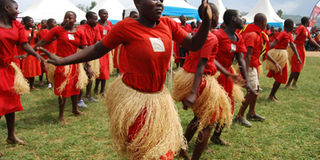Mentorship is best way to keep girls in school

School girls face a number of challenges including accepting their body changes. Mentoring them raises their self esteem. PHOTO BY RAjab mukombozi
What you need to know:
- Activists argue that although there are remarkable strides in promoting girl-child education, girls still face numerous hurdles that hinder them from reaching their full potential.
Society has always had debates about why men occupy most political or top company positions compared to women.
During a get together organised by Forum for African Women Educationists Uganda in 2018, women leaders argued that although there have been efforts geared towards promoting girl child education, there is still a number of hiccups hinged on the patriarchy societal setting that have hampered women’s progress.
This aside, could there be underlying issues geared by the early transition period of a girl into womanhood?
Rebecca Nassuna, a 32-year-old public relations practitioner, says she was a very happy child in school until her body started to change. “I was full of life and participated in MDD, sports, and had a vibrant social life,” she comments.
Unknown to her though was that her colourful childhood would spiral downwards, once signs of womanhood manifested. At 16, her bosom suddenly became bigger and with it came weight gain. Not used to looking and feeling that way, she became timid and like many girls in the school started to cover her chest with a sweater any time she had to make movement.
As the inner turmoil went on, it did not help that she started hearing murmurs that her big bosom was a result of getting involved in sexual activity.
“I was a sports prefect at the time but did not receive my leadership certificate because of reduced activity,” Nassuna shrugs at the unpleasant memory.
Like Nassuna, Rashim Nabanja, 22, says at 13, she had a bigger bum than many Senior One girls at Kibuli S.S.
“Boys would gather at a corner of my class and cheer as I passed by. If I asked for permission to go for a short call, my fellow classmates would boo me as I walked by. I started to move out only if other students were doing so as well. Sometimes I would feign sickness to avoid going to class,” she recounts.
While these girls had it rough, girls at St James Secondary School, Kawempe will have a happier tale thanks to 20-year-old Diana Mukazanira, a student at Kyambogo University.
Helping hand
Seeking to contribute to what she loves, she landed an opportunity to be one of the 10 facilitators trained by Project SOAR, a girl child project originally based in Morocco and piloted by Open Space Centre in Uganda.
The project works with five underprivilidged schools with the aim of empowering teenage girls to reach their full potential and become leaders of the future. Mukazanira facilitates gatherings with the girls at school and together with a co-facilitator they mentor them on how to become women who can meet their full potential.
Sheebah Namaganda, a 14-year-old student at St James Secondary School, says her period is heavy causing her to use a lot of sanitary pads a day. And because her mother was unable to meet the cost of these pads, she suggested using towels.
“Towels makes you self-conscious. You feel something stuck between your legs and worry about it getting noticed,” she says.
But Namaganda says because of these meetings she now feels more secure during her period.
More than menstruation
Navigating menstruation is no doubt a challenge to many young girls, however, they have more blocks to overcome, one of which Mukazanira says is body rights and awareness.
She says experience has showed her that girls tend to show growth in academics yet continue to have low self-confidence as their bodies change.
“Their academics do not reflect in leadership and general social competitiveness as compared to their male counterparts,” she asserts. She mentions that girls experiencing changes are building identity and self-expression therefore, if tainted with low self-esteem, it affects their confidence, self-worth and willingness to put themselves out for opportunities.
Gladys Rwantale, a Senior Three student at St James Secondary School, says she always had a problem with presenting herself in public. As she narrates her experience now, this may be hard to believe basing on the confidence she exudes.
Rwantale says her turning point was when she met Mukazanira.
“I was attracted to her by the way she dressed and presented herself and I told myself that I would be like her one day,” she reveals.
Having a role model to look up to, she now aims at looking her best. “I have learnt to be very clean,” Rwantale states, adding, “When I started to look good, I felt better about myself and gained more confidence. The teachers saw the difference and encouraged me to campaign. Now, I am the head girl,” she shares.
The struggle continues
According to Sophia Nagujja, an administrator at St James Secondary School, the girls are going through a normal stage, however, it can be disastrous if they are not well guided.
“Some of the girls refuse to go for lunch because it looks ‘uncool’ for a girl to queue up for food. A few of them have ended up getting ulcers just because of such issues. Such tendencies are why mentorship is important to raise their esteem,” she said.
It is only through encouragement that girls will overcome their fears and turn out to be good leaders and people that can change a communities for the better.
Be a good mentor
Cultivate trust. A mentor may be the only person in a girl’s life she can be open and honest with.
Be a friend. A mentor’s primary role is to act as a wise, caring friend and supporter for girls. This relationship is less formal than a teacher-student relationship.
Be a listener. Active listening shows the speaker that the listener truly cares about what is being said.
Be dependable. Mentees need consistency. Showing up not only shows reliability, but also builds trust. Host regular meetings and be on-time, every time.
Empower them. Validate feelings, goals and dreams. Mentors play an important role in encouraging girls to set goals and develop steps to achieve them.
Source: Room to Read




